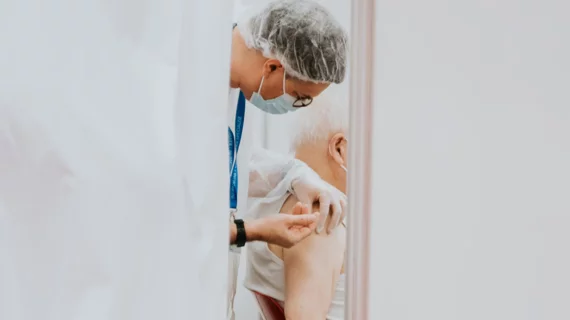Geriatrician gives 3 reasons older Americans should get the latest COVID jab now-ish
Early May will mark the first anniversary of the officially declared end of the COVID-19 public health emergency by the U.S. Department of Health and Human Services. Nevertheless, the Centers for Disease Control and Prevention continues urging Americans to keep up with updated vaccinations.
The agency is especially concerned about demographic groups at elevated risk for serious symptoms if infected. At the top of the list are adults 65 and older.
At the nonprofit, independent news site The Conversation, an academic geriatrician is helping spread the word.
Laurie Archbald-Pannone, MD, of UVA Health in Virginia urges seniors to consider three reasons for getting a jab this spring. Here’s a summary.
1. Increased age means increased risk.
Compared with other age groups, older adults have the worst outcomes with a COVID-19 infection, Archbald-Pannone points out. “Increased age is, simply put, a major risk factor,” she adds. More:
Even now, four years after the start of the pandemic, people 65 years old and up are about twice as likely to die from COVID-19 than the rest of the population. People 75 years old and up are 10 times more likely to die from COVID-19.
2. Vaccination is still safe, effective—and more beneficial than risky.
Being appropriately vaccinated is “as critical in 2024 as it was in 2021 to help prevent infection, hospitalization and death” from COVID-19, Archbald-Pannone writes. More:
The updated COVID-19 vaccine has been shown to be safe and effective, with the benefits of vaccination continuing to outweigh the potential risks of infection.
3. Long COVID can compromise the immune system.
Keeping up to date with COVID-19 immunization “has a fourfold decrease in risk of developing ‘long COVID’ symptoms if you do get infected,” Archbald-Pannone notes. “Known as immunosenescence, this puts people at higher risk of infection, including severe infection, and decreased ability to maintain immune response to vaccination as they get older.” More:
The older one gets—over 75, or over 65 with other medical conditions—the more immunosenescence takes effect.
“All this is why, if you’re in this age group, even if you received your last COVID-19 vaccine in fall 2023, the spring 2024 shot is still essential to boost your immune system so it can act quickly if you are exposed to the virus,” Archbald-Pannone concludes. “The bottom line: If you’re 65 or older, it’s time for another COVID-19 shot.”

